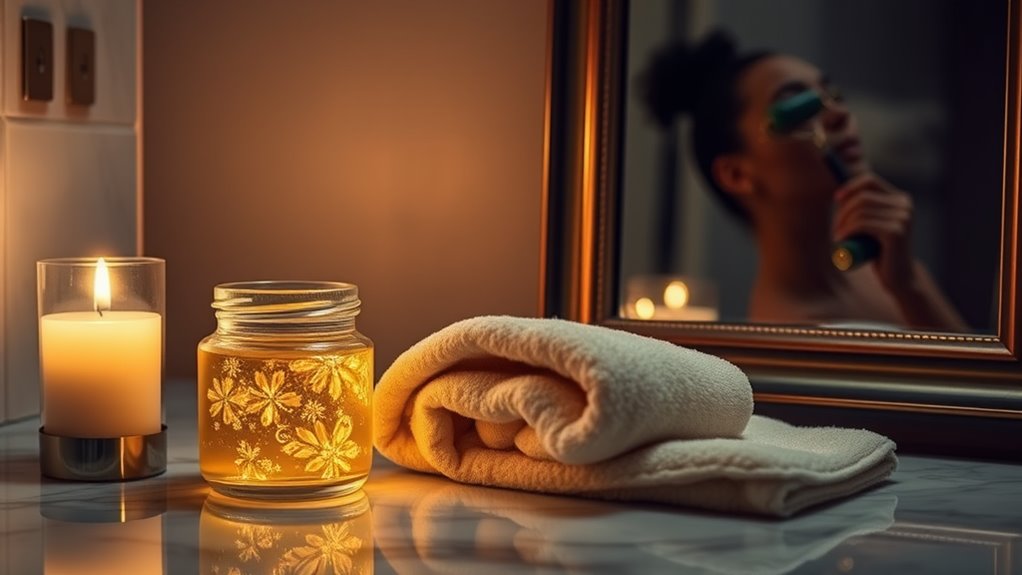The Secret to Radiant Skin. It Starts at Night
To achieve radiant skin, prioritize your nighttime routine. Beauty sleep is essential as it repairs skin and reduces signs of aging. Establish a consistent bedtime, use a thorough skincare regimen that includes cleansing, toning, and moisturizing, and stay hydrated for ideal overnight skin health. Additionally, sleep positions matter—resting on your back can enhance blood flow and minimize wrinkles. With the right practices, you’ll nurture your skin’s natural glow and resilience. Discover more ways to elevate your night routine.
The Importance of Beauty Sleep
Have you ever wondered why a good night’s sleep is often hailed as a beauty secret? Beauty sleep benefits extend beyond mere folklore; scientific research backs it up.
When you sleep, your body repairs and regenerates skin cells, promoting a youthful glow. Lack of sleep can lead to increased stress hormones like cortisol, which may cause breakouts and dullness.
Furthermore, quality rest reduces dark circles and puffiness, helping you look refreshed. So, prioritize those Z’s, as adequate sleep plays an essential role in maintaining your skin’s health and appearance.
Incorporating an effective nighttime skincare routine can further enhance the rejuvenating effects of your beauty sleep. It’s not just rest; it’s an essential beauty regimen you can’t afford to skip.
Nighttime Skincare Routine Essentials
A good night’s sleep lays the foundation for a vibrant complexion, but the right nighttime skincare routine amplifies those benefits.
Start by cleansing your face to remove impurities and makeup; this prevents clogged pores.
Follow with a toner to balance your skin’s pH and prepare it for better absorption.
Apply a serum rich in antioxidants or hyaluronic acid to hydrate and repair.
Finish with a nourishing moisturizer to lock in moisture and enhance your skin barrier.
If needed, include targeted treatments for concerns like acne or dark spots.
These essentials work together to rejuvenate your skin overnight, ensuring you wake up glowing. Additionally, incorporating effective cleansing techniques can further enhance the results of your nighttime routine.
How Sleep Affects Skin Regeneration
How essential is sleep for your skin’s regeneration?
During deep sleep, your body works hard to repair and regenerate skin cells.
Studies show that sleep deprivation can lead to increased signs of aging, such as fine lines and dullness.
Your skin’s barrier function is compromised when you don’t get enough rest, making it more susceptible to environmental damage.
Additionally, growth hormone levels rise during sleep, promoting collagen production and skin elasticity.
Prioritizing quality sleep not only helps your skin recover but also enhances overall complexion and radiance. Furthermore, poor sleep can trigger psychological stress, which has a direct impact on skin health.
The Role of Hydration in Overnight Skin Health
While quality sleep rejuvenates your skin, hydration plays an essential role in maintaining that overnight glow. When you’re well-hydrated, your skin retains its moisture, preventing dryness and flakiness.
Research shows that adequate hydration helps improve skin elasticity and overall texture, allowing for a plumper appearance by morning. Drinking water before bed can support this process; however, topical hydration is equally important. Using a nourishing night cream or serum locks in moisture, enhancing your skin’s barrier function.
Ultimately, staying hydrated both internally and externally guarantees your skin remains vibrant, healthy, and ready to face the day ahead. Additionally, studies indicate that adequate hydration can lead to improvements in skin conditions such as acne and eczema.
Sleep Position and Its Impact on Skin
Ever wondered how your sleep position influences your skin’s appearance?
Studies show that sleeping on your stomach or side can lead to increased pressure on your face, potentially causing sleep lines and contributing to premature aging. This pressure can also hinder circulation, depriving your skin of essential nutrients.
Conversely, sleeping on your back may reduce friction and allow for better blood flow, promoting a healthier complexion. Additionally, using a silk pillowcase can minimize irritation and moisture loss. Regularly changing your pillowcases can help eliminate bacteria and dead skin cells, contributing to clearer skin and preventing acne breakouts.
Tips for Improving Your Nighttime Sleep Quality
To improve your nighttime sleep quality, start by optimizing your sleep environment.
Make sure your bedroom is dark, quiet, and cool to promote restful sleep.
Additionally, establishing a consistent bedtime routine can signal your body that it’s time to wind down, enhancing your overall sleep experience.
Optimize Sleep Environment
How can you create an ideal sleep environment that promotes better nighttime rest?
Start by ensuring your bedroom is dark, quiet, and cool.
Use blackout curtains to block light and consider a white noise machine to mask disruptive sounds.
Your mattress and pillows should support your body comfortably, so invest in quality bedding.
Limit screen time before bed, as blue light can interfere with melatonin production.
Finally, keep your room tidy and free of clutter to reduce stress and promote relaxation.
Establish a Bedtime Routine
What steps can you take to establish a bedtime routine that promotes restful sleep?
Start by setting a consistent sleep schedule—going to bed and waking up at the same time daily helps regulate your body’s internal clock.
Incorporate calming activities, like reading or meditation, to signal your brain that it’s time to wind down.
Avoid screens at least an hour before bed, as blue light can disrupt melatonin production.
Create a relaxing environment by dimming lights and maintaining a comfortable temperature.
Finally, limit caffeine and heavy meals in the evening to enhance sleep quality and support skin health.

